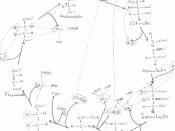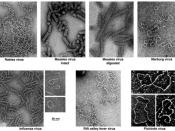The term 'life', is in itself, a vague entity. Different people have different perceptions of what 'life' is. To some, life is the quality of living; to others, it is their very existence itself. In biological terms, I have defined 'life' to be the ability to function, be it as a complex multicellular organism, or a single-celled protozoan. This is brought about by vital processes such as regulation and control, respiration, defence and reproduction. Without these processes, the organism cannot function. We must then analyse what role do enzymes play in these processes.
An enzyme is a globular protein. Its basic unit is the amino acid, made up of the elements Carbon, Nitrogen and Hydrogen. Each enzyme has a specific 3-dimensional configuration, and an active site specific to the molecule it binds to. The active site is made up of a unique sequence of R groups, with different shapes, giving the site its shape.
There, the substrate binds and undergoes a series of catalytic reactions after which the products leave the active site. This leaves the enzyme free to carry out more catalytic reactions. An enzyme is also sensitive to changes in temperature and pH. Different enzymes have a different optimum temperature and pH at which to function. Most enzymes are denatured at high temperatures, and deactivated at low temperatures.
The general function of an enzyme is to speed up, or catalyze reactions in the organism. It helps the substrate to overcome the activation energy barrier that it must reach in order to change into the products. This thus enables the cell to have a dynamic metabolism. The enzyme remains unchanged after the reaction, and merely serves to speed up the rate of reaction. In other cases, the mere presence of the enzyme is a precursor to a whole cycle...


